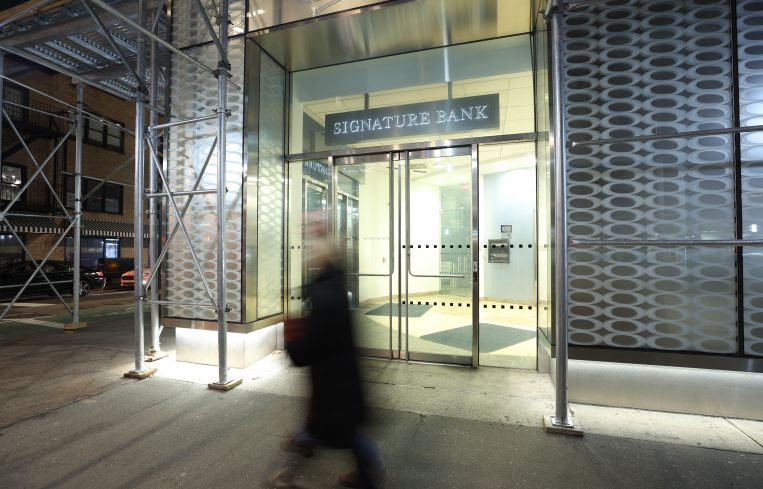Major NYC Lender Signature Bank Shuttered by Regulators
Manhattan-based company was active lender in New York metro region.
By Andrew Coen March 13, 2023 11:07 am
reprints
Signature Bank – a commercial real estate lender with a major presence in the New York City market – was closed by state regulators Sunday two days after the collapse of Silicon Valley Bank (SVB), regulators announced.
The Federal Deposit Insurance Corporation is seizing control of Signature’s assets on the heels of SVB becoming the biggest U.S. bank collapse since Washington Mutual in 2008 during the Global Financial Crisis. All Signature and SVP depositors will be “made whole” and “no losses” will be borne by the taxpayer, the FDIC, U.S. Treasury Department and Federal Reserve said in a joint statement.
The bank’s demise was fueled by its heavy exposure in cryptocurrency, which stood at $16.52 billion, The New York Times reported Sunday. Signature made a big investment in crypto assets in late 2018 with the launch of its digital payments platform called Signet.
Manish Shah, senior managing director at Palladius Capital Management, said he has heard of at least 20 regional banks facing scrutiny by the FDIC and regulators. Shah said the government stepping in when they did was crucial to keeping regional banks afloat, but cautioned that investors may be more leery in the near-term about parking money in smaller banks, which could have major consequences for CRE lending.
“Unless you feel comfortable that money above $250,000 is safe, it’s very difficult to justify staying at a regional bank,” Shah said. “If regional banks either are taken over or have to pull back because they need higher capital ratios or they just have less equity because investors don’t want to be investors in regional banks, then you will see a significant pullback in all of this real estate lending and construction lending.”
Since 2018, Manhattan-based Signature has had a large CRE lending business run by Joseph Fingerman. The regional bank, which was ranked 45th in Commercial Observer’s Power Finance 50 last year, executed 632 loans and $4 billion of new transactions in 2021. The bank’s 2022 CRE lending volume has not been announced.
Signature was involved in some large CRE deals last year including supplying a $155 million refinance loan in December for 777 Third Avenue, a Midtown Manhattan office property owned by a joint venture between Sage Realty and The Travelers Companies. It also provided a $210 million acquisition loan last August for Harbor Group International and Azure Capital Partners to purchase Avalon Green, a multifamily asset in Elmsford, N.Y.
Liquidity woes facing Signature and SVB are also coming to the surface at smaller banks, including First Republic Bank, which saw a 65 percent decline in its bank stock Monday morning, CNBC.com reported.
Concerns about the state of the regional banking sector while larger banks remain on the sidelines could open doors for private lenders to fill the lending void for CRE borrowers.
Seth Weissman, managing partner at Urban Standard Capital, said he has fielded six phone calls since SVP’s collapse Friday from borrowers with loans scheduled to close in the next 30 to 60 days are considering private lenders as an alternative path. He said in a couple cases sponsors were having trouble getting clear answers from loan officers at regional banks about where their deals stand, which prompted them to inquire with private lenders about a plan B.
“Post Dodd Frank with all the regulatory changes there has been a trend towards private capital markets and this will only accelerate that,” Weissman said. “The veneer of stability has definitely worn quite thin and especially for transitional loans where the duration may only be 12, 24 or 36 months, more and more people are gravitating toward the private markets and I think that will continue.”
Eric Orenstein, a member of law firm Rosenberg & Estis’ transactional department, said clients he works with pulled funds from Signature on Friday, and there are now mounting concerns about borrowing from smaller banks given the state of the market.
Orenstein noted that the collapse of Signature also leaves a major void in the CRE space since the bank had stepped forward in the past 18 months to handle cash management services for New York City sponsors after Wells Fargo pulled out of that business.
“Taking away Signature, which was a major player in the New York market, will have a major effect,” Orenstein said. “It will be interesting to see what bank steps into that [role] now.”
Greg Carmichael, former CEO at Fifth Third Bancorp, was appointed by the FDIC to serve as CEO of Signature as the bank while it seeks to stabilize its assets
“Because of the swift actions of the U.S. Treasury, Federal Reserve, and FDIC, our clients’ deposits are not at risk,” Carmichael said in a statement Monday morning. “We value our clients, and we believe our single point of contact model will continue to deliver the best-in-class products and services they desire.
Andrew Coen can be reached at acoen@commercialobserver.com



